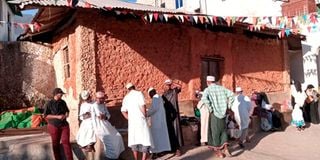‘Tete’ film pays homage to a great scholar

The Riyadha Mosque and Islamic Centre whose construction started in 1892. The mosque has over 120 years of existence in Lamu Old Town. It was founded by Habib Swaleh, an Islamic scholar.
What you need to know:
The film seeks to prevent further deterioration, disappearance and destruction of the rich, multi-faceted heritage.
The film also includes an exclusive tour of Habib Swaleh’s archaic home and an exploration of the artifacts of extreme intrinsic value.
Omar Kibulanga is the man behind the first-ever documented film of Habib Swaleh, an iconic individual whose legacy and influence on education, science, and culture still lingers along the East African coastline.
Tete is a story that is scripted and narrated in poetic Swahili language, accompanied by Arabic and English subtitles. It encompasses a background of a special Swahili poem dedicated to Habib Swaleh by the late legendary poets from Lamu - The Kadaras (father and son).
According to Kibulanga, this film seeks to prevent further deterioration, disappearance and destruction of the rich, multi-faceted heritage propagated by the late Habib Swaleh; which has been threatened as long it has been in existence.
The scholar-cum-herbalist was born in the Comoro Islands in the 1800s but later settled and thrived in Lamu.
“This one-hour film highlights the life and significant contributions of this natural leader, mainly through the lenses of his great-grandchildren in order to assert authenticity,” he says.
“His relentless attempts to trigger social transformation and globalisation of the conservative community with a careful consideration to the indigenous traditions and spiritual values.”
Swahili architecture
The film, currently streaming on YouTube, premiered last week at Alliance Française de Mombasa and shows how Habib Swaleh still enriches the cultural diversity and human creativity through the establishment of Lamu’s Grand Maulid Festival; where believers gather annually at Riyadha to commemorate the birth of Prophet Mohammed through ceremonial rituals.
In 1870, Habib Swaleh, who was then 18, travelled to Lamu to visit his uncle Sayyid Ali bin Abdullah, who had migrated and settled there in 1847, to seek medication for an illness which had affected his legs.
Upon reaching Lamu, Habib Swaleh took to learning under the then Lamu’s renown scholars, including his uncle. After a year, his father ordered him to return to the Comoro Islands.
Habib Swaleh, who died in 1935, stayed in the Comoros Islands for about a year after which his father allowed him to travel back to Lamu. Through the narration of Kibulanga, it shows his individual role in the production and propagation of educational heritage by establishing arguably the earliest institution of higher learning in Eastern and Central Africa - Riyadha.
It explains how he brings an open door policy at Riyadha and provides quality education to locals, regardless of their social stratification, despite huge opposition from the Lamu’s elite. He inherits, masters, and promotes the knowledge of herbs, medical therapies and naturopathy.
The film also includes an exclusive tour of Habib Swaleh’s archaic home and an exploration of the artifacts of extreme intrinsic value. It unravels the profound intangible heritage and expertise in Swahili architecture, carpentry, as well as mystical powers.





